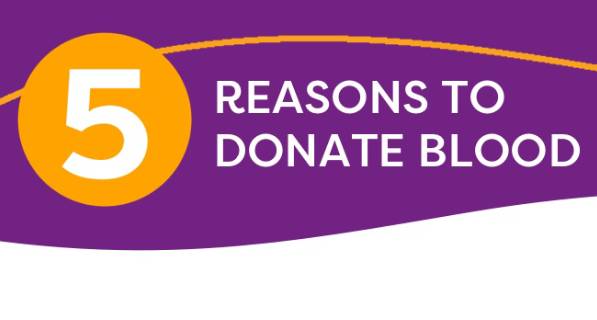There is a blood drive coming up near you, and you’ve been asked to schedule an appointment, but you are not so sure you should donate blood.
If you’ve donated before, you know that empowered feeling you get from helping others (and it took less than one hour total!). If you’ve never donated blood, it’s completely natural to feel a bit anxious about the experience. You can overcome your concerns by focusing on the top reasons you should give blood:
![]()
1. One blood donation can save up to three lives.
Your blood is composed of three key elements: blood cells, platelets, and plasma. Each of these components can be used to help a different patient. Red blood cells are a big help for surgery patients, platelets often go to cancer patients, and plasma is often used for trauma and burn patients.
![]()
2. There is no substitute for human blood.
We tend to assume there will be blood available when it is needed, but blood cannot be manufactured. It can only come from a person who donates it. Approximately 30,000 units of blood are used in the U.S. each day, and every 2 seconds, someone in the U.S. needs a blood transfusion. Blood shortages occur regularly and potentially can cause a delay in treatment for patients.
![]()
3. Donating blood is a volunteer activity that’s actually good for you.
It’s a great way to help your community and only takes about one hour of your time! Donating blood is one of the best gifts you can give to help patients and honor loved ones. It’s very personal, and you’ll feel amazing knowing that your donation has a direct impact on the life of a stranger in dire need. In fact, donating blood can work wonders for your mental health, too. Multiple studies reveal that helping others can reduce stress, improve your emotional well-being, reduce negative feelings and feelings of isolation, and give you a sense of belonging.
![]()
4. There’s always a need for blood donors.
One out of every 7 people who enters a hospital will need blood. And hospitals use more than 6,000 units of platelets and nearly 6,000 units of plasma daily. That means more than 10,000 people need to donate blood daily to meet patient need—yet only about 3% of Americans donate each year. As long as you are in good general health, weigh at least 110 pounds and are at least 16 years of age, you most likely meet eligibility requirements.
![]()
5. You’ll learn about your blood type…and more!
If you’ve ever wondered what blood type you are, donating blood is a great way to find out. You’ll also learn your cholesterol levels. Before every donation, you get a free mini-physical. A health care professional checks your pulse, blood pressure, temperature and hemoglobin levels. Samples of your blood are tested for several diseases, including hepatitis B, hepatitis C, HIV, and Trypanosoma cruzi. This mini-physical can offer great insight into your health and potentially detect an underlying medical condition or health risk.
Still have questions about what it’s like to donate? Here’s a quick overview of the blood donation process.
Ready to book your appointment?
Published by: Jeremy T. — Vitalant Contributor

